On 17 September Hitler finally cancelled the planned invasion of Britain, though the Battle of Britain was to continue until the end of October, and the sporadic bombing of British towns and cities would last for many more months. The Luftwaffe had switched to night bombing after suffering so many losses, and this week London and Merseyside were heavily bombed. Also this week, the Italian invasion of Egypt halted because of supply issues before they could reach the main British positions, about 80miles away.
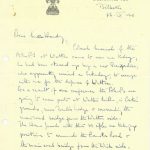 Meanwhile, no one in Britain knew that the invasion had cancelled, and the Home Guard and
Meanwhile, no one in Britain knew that the invasion had cancelled, and the Home Guard and 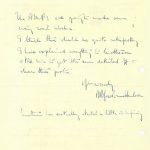 the Auxiliary Military Police (“AMPs”) were making preparations for the defence of Watten. “Colonel Manuel of the AMPs at Watten came to see me today, he had been stirred up by a war Brigadier, who apparently arrived on Saturday to arrange with me for the defence of Watten. As a result of our conference the AMPs are going to man posts at Watten Mills, in Crutie’s grounds, near Bank’s Lodge, & commanding the main road bridge from the Watten side. The Home Guard with their 14 rifles are taking up position to command the Camster Road & the main road bridge from the Wick side. The AMPs are going to make some swing road blocks.”
the Auxiliary Military Police (“AMPs”) were making preparations for the defence of Watten. “Colonel Manuel of the AMPs at Watten came to see me today, he had been stirred up by a war Brigadier, who apparently arrived on Saturday to arrange with me for the defence of Watten. As a result of our conference the AMPs are going to man posts at Watten Mills, in Crutie’s grounds, near Bank’s Lodge, & commanding the main road bridge from the Watten side. The Home Guard with their 14 rifles are taking up position to command the Camster Road & the main road bridge from the Wick side. The AMPs are going to make some swing road blocks.”
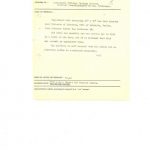
Also in Watten, an unexploded bomb was reported to the police on 16 September: “Egg-shaped hole measuring 18” by 12” has been located near Dhulochs of Shielton, Hill of Acharole, Watten… The sides are smoothly cut and nothing can be felt at a depth of six feet, and it is presumed that this may contain an unexploded bomb. The position is well removed from any houses and no immediate action is considered necessary.”
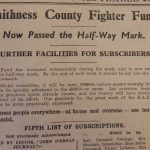
The people of Caithness continued to raise funds to pay for a “Caithness” fighter plane. The John o’Groat Journal reported this week that the fund was now over half way towards its target, and was even expected to reach over £4,000 next week. With the Battle of Britain still raging over the skies of Britain, “Our gratitude for the great work of the RAF could not be more practically expressed”.
Finally this week, the war continued to force shocking changes on all aspects of Caithness life, and the fishing industry was no exception: the John o’Groat Journal featured a story about a Latheronwheel fishing boat that now had a woman crew member! The boat was the Ruby, and the woman was Mrs Dunnett, aged 26, whose husband was a prisoner of war; she was taking the place on the boat of her brother, Alexander Keith, who was serving in the navy. “She … takes a full share in the work, shooting and hauling the nets, and taking a turn with the oars.” The paper also reassured its readers that “Mrs Dunnett likes the sea, and never suffers from sea-sickness.”
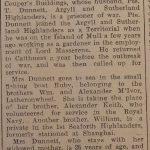 Interestingly, the other two crew members and owners, William and Alexander M’Ivor, acted as coastwatchers at night; and so the boat would shoot its nets in the early evening, return to harbour, and then go back the next morning to haul them in.
Interestingly, the other two crew members and owners, William and Alexander M’Ivor, acted as coastwatchers at night; and so the boat would shoot its nets in the early evening, return to harbour, and then go back the next morning to haul them in.
